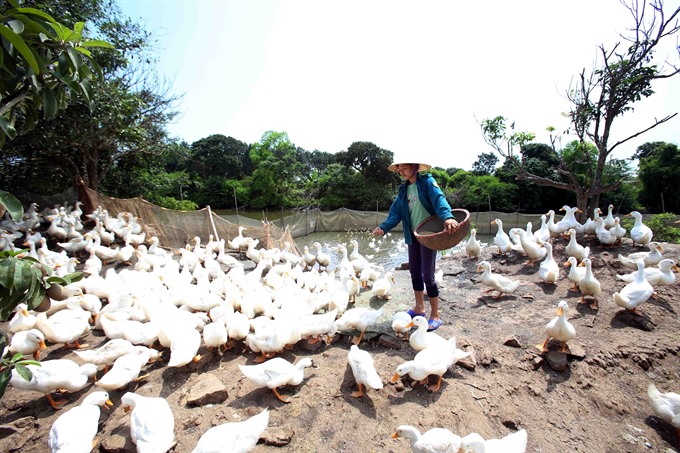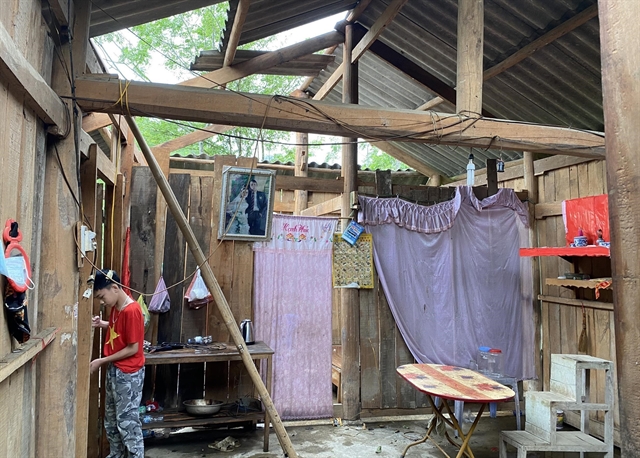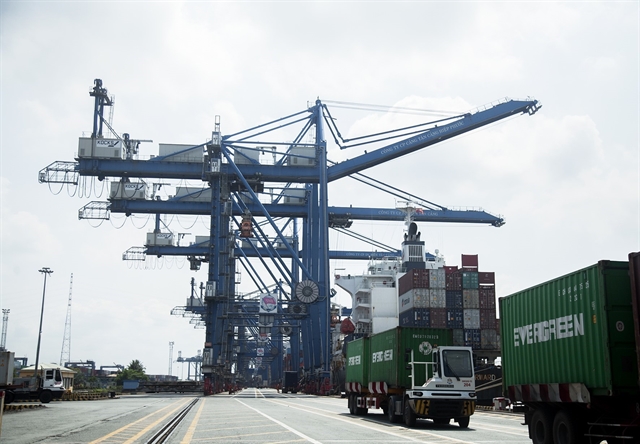 Economy
Economy

Ministry of Finance (MOF)’s two different proposals to increase value-added tax (VAT) would create various impacts on the overall economy and household welfares, said Nguyễn Đức Thành, Director of the Việt Nam Institute for Economic and Policy Research (VEPR).
 |
| Farmer Trần Thị Hè takes care of her flock of 2,000 ducks, worth VNĐ120 million, in Phù Cừ District in the northern province of Hưng Yên. The MoF’s proposed VAT increase will have a negative impact on household welfare, according to a new study. — VNA/VNS Photo Phạm Kiên |
HÀNỘI — The Ministry of Finance’s (MOF) two proposals to increase value-added tax (VAT) would have various impacts on the overall economy and household welfare, said Nguyễn Đức Thành, Director of the Việt Nam Institute for Economic and Policy Research (VEPR).
Thành made the statement during a seminar held by VEPR on Thursday in Hà Nội, themed ‘Assessing the impacts of value-added tax increases on the overall economy and household welfare’.
Since 2017, the MoF had repeatedly proposed amendments to current tax laws towards increasing the number of tax rates, including raising the VAT under two separate scenarios.
Under the first scenario, VAT will be raised by 20 per cent, meaning that the commodities currently subject to 5 per cent and 10 per cent VAT, will be levied at 6 per cent and 12 per cent VAT, respectively.
The second scenario proposed is that commodities currently liable for a rate of 5 per cent VAT will be subject to a new VAT rate of 10 per cent. Meanwhile, commodities subjected to 0 per cent and 10 per cent VAT will experience no adjustment.
“VERP organised the seminar to announce a study which assessed the impacts of the MoF’s VAT increase proposal on household welfare, measured by the changes in the average expenditure of households and the rate of poor households after VAT is increased in each scenario,” Thành said.
Nguyễn Việt Cường, a lecturer from the National Economics University and member of VEPR’s research team, said that with a fixed supply, raising VAT would increase the prices of the commodities.
With household budgets remaining unchanged, rising commodity prices would affect household consumption and welfare, Cường said.
According to the Việt Nam Household Living Standard Survey (VHLSS) by the General Statistics Office in 2016, Việt Nam’s average annual expenditure per capita is over VNĐ34.5 million, or an average monthly expenditure per capita of VNĐ2.9 million.
VEPR’s research team said that the first scenario would have a stronger impact on households compared to the second.
Specifically, the first scenario would reduce household expenditure by 0.89 per cent, while the second scenario would reduce expenditure by 0.32 per cent.
The rate of poor households would increase by 0.26 percentage points if VAT is adjusted under the first option, and increase by 0.22 percentage points under the second option. The corresponding increase in the number of poor people in the two scenarios would be 240 people and 202 people, respectively.
However, according to the research team, the second option will also have negative effects on low-income households. Therefore, the government should carefully consider adjustments to VAT, as this is a trade-off between increasing the State budget and boosting economic growth as well as reducing poverty.
Fruitless
From a macro perspective, the study also showed that with the first scenario, state budget revenue will increase by 4.9 per cent. If the government spends the additional taxes on investment, total social investment will be by 1.7 per cent. However, total household income and expenditure will decrease by more than 0.9 per cent. Therefore, the real output of the economy would not increase.
Meanwhile, with the second plan, State budget revenue will increase by 2 per cent, lower than that in the first scenario. If the government uses this money on development investment, total social investment will rise by nearly 1.8 per cent.
“However, total household income and expenditures will reduce by 1 per cent. As a result, the output of the economy would not increase, too, similar to the first scenario,” Cường said.
With these analyses, VEPR’s research team concluded that raising VAT does not increase the real output of the economy but leads to a reduction in household welfare.
“Therefore, this study does not agree with the proposed VAT increase,” Cường said. — VNS









